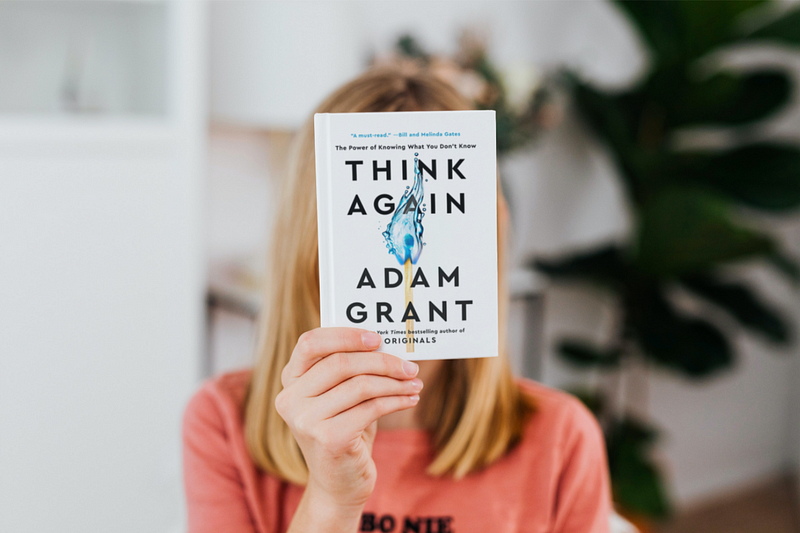Adam Grant’s principles can change the way you think.

“When was the last time you changed your mind about something?” I send to all new online dating matches. I want to test whether they foster a flexible, curious mind.
Changing your opinion when presented with evidence or arguments is one of the most valuable skills you can have in the 21st century. In fact, it’s so relevant, well-known psychologist Adam Grant dedicated an entire book about it.
Bill and Melinda Gates say ‘Think Again’ is a must-read. If you’re willing to expanding your mind, you can learn a lot from this book. The following insights can improve your ability to rethink and change your mind.
Embrace Your Second Thoughts
“You can’t change your opinion all the time,” my parents used to say whenever I liked something that I previously disliked. “It makes you weak.” So whenever I changed my mind, I felt guilty.
Society values character traits such as decisiveness and having a strong opinion. It gives a sense of control and stability. But this thinking is flawed.
If I could talk to my younger self, I’d say changing your mind isn’t a bad character trait. It means you’ve got a flexible mind and are open to learning.
When you don’t allow for rethinking your opinions and updating your beliefs, you stagnate. You’ll stop challenging your ideas and numb yourself through life.
“Decisiveness is overrated,” Adam Grant writes, “but I reserve the right to change my mind.”
“We laugh at people who still use Windows 95, yet we still cling to opinions that we formed in 1995.”
The Smarter You Are, The Harder You Might Fail
In our world of information overload, your intelligence isn’t all that matters. In fact, your heightened ability to learn and think can be counterproductive. Recent research suggests the smarter you are, the harder it is to update your beliefs.
Most smart people lack intellectual humility — they’re unaware of what they don’t know. Here’s an example.
When you just read a few books in your life, you’re likely aware of what you don’t know. But once you’ve read a good deal, you become ignorant. You might be too confident, too sure, and less aware of the things you don’t know.
That’s why I love antilibraries, a collection of unread books. Antilibraries represent unknowledge. They’re a great cure for overconfidence and ignorance.
“You will never read all those books,” friends say when they look at my want-to-read list. They’re right. The list grows by two books every day. Even though I read two books a week, I will only read very few of them.
But that’s the point. My antilibrary is a constant reminder of what I don’t know. It helps me stay curious and humble.
If you want to learn something new, you first need the humility to see what you don’t know.
“If knowledge is power, knowing what we don’t know is wisdom.”
The True Purpose of Learning
Grant tells the story of Spanx founder Sara Blakely. While she knew she could turn her idea en idea for footless pantyhose into reality, she doubted having the right tools for it.
Blakely relied on her beginner’s mindset and learned as much as possible about prototyping and patent law. What made her successful was her confidence in learning anything she would need.
It’s your mindset, your views on your intelligence, and your abilities that determine how much you learn.
Researcher Carol Dweck highlights the differences between the two types of thinking. Even though her model falls prey to the binary bias, her categorization can help us understand the distinct mindsets.
People with fixed mindsets believe intelligence is a fixed trait. In contrast, individuals with growth mindsets, such as Sara Blakely, see intelligence as something that grows by acquiring knowledge and skills.
“The purpose of learning isn’t to affirm our beliefs; it’s to evolve our beliefs.”
The Potential Power of Imposter Syndrom
Many people bought into the story that you can become successful despite your doubts. But what if your doubts drive success?
Basima Tewfik led a study to explore this idea. She invited med students who were about to start their clinical rotations two times. On their first visit, the students answered a survey on impostor syndrome. They were, for example, asked how often they think stuff like “I am not as qualified as others think I am.”
A week later, she invited these med students to inspect patients (who were played by actors). Similar to their professional reality, the students diagnosed diseases and suggested treatments.
Twefik tracked whether the students made the right diagnoses and how they handled their patients.
Guess what: the students with stronger imposter syndrome did significantly better — they scored higher on empathy, respect, professionalism, and communication.
This evidence is new and has not yet been replicated among other studies. But we might have been wrong about judging impost syndrome as a weakness.
“Feeling like an impostor can make us better learners. Having some doubts about our knowledge and skills takes us off a pedestal, encouraging us to seek out insights from others.”
Final Thoughts
Philosopher Bertrand Russell wrote almost a century ago, “the fundamental cause of the trouble is that in the modern world the stupid are cocksure while the intelligent are full of doubt.”
To not operate among the stupid, keep in mind to:
- update your beliefs when presented with evidence and new arguments
- remaining aware of what you don’t know
- looking for ways to learn and evolve your beliefs
- use your doubts to seek out insight from others
By valuing curiosity, learning, and mental flexibility, you will not only win my heart but also live a happier and wiser life.